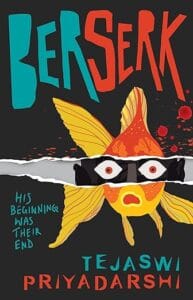
I received a copy of this book from the publisher for an unbiased review.
Tejaswi Priyadarshi’s Berserk is not a novel you read; it’s a novel you survive. A dark, relentless descent into the human psyche.
A harrowing psychological thriller that blends horror, drama, and emotional trauma, this book is a gut punch to the unsuspecting reader and a grim delight for those who revel in the darker corridors of the human mind.
At its core is Ramakrishna, a mild-mannered teacher whose life takes a gruesome turn when his bride, Nazm, is brutally murdered on their wedding night. What follows is not just a quest for justice but a descent into madness, as he joins forces with the enigmatic and morally volatile “Coffee Man.” Their alliance is uneasy, their methods more so. Meanwhile, another thread—a renunciate turned vigilante, obsessed with vengeance—interweaves with their tale, setting the stage for an eventual crescendo of carnage and confrontation.
What truly stands out in Berserk is Priyadarshi’s mastery over character and tone. Ramakrishna’s psychological disintegration is handled with remarkable precision. His quirks, vulnerabilities, and internal conflicts are rendered in a way that draws the reader in slowly and thoroughly—until you realize, with some alarm, that you’re thinking like him.
The tone is consistent throughout, maintaining an oppressive intensity that never once slackens. Whether set in the bustling lanes of Mumbai or the quieter corners of Bangalore, the atmospheric settings are detailed and immersive, grounding the reader in the reality of the cities even as the story spirals into psychological chaos.
Language-wise, the prose is unpretentious, which works to its advantage. The storytelling leans towards ‘tell’ over ‘show’—a deliberate and effective choice when the goal is to place readers inside a disintegrating mind. The effect is claustrophobic and compelling. The more you read, the more you find yourself succumbing to Ramakrishna’s unravelling logic.
Even the cover design deserves a nod—it’s ominous, evocative, and aptly aligned with the book’s central themes of madness and vengeance.
That said, Berserk comes with fair warning. The violence is explicit and frequent—disturbingly so at times. It’s not just graphic; it feels personal, almost sadistically detailed. This is not horror for the faint-hearted, but for those who can stomach psychological torment delivered with surgical precision. Similarly, the intimate scenes, while narratively justified, are vividly portrayed and can be discomfiting, especially for readers unaccustomed to such visceral storytelling.
In sum, Berserk is a bold and bloody foray into the dark recesses of grief, rage, and human fragility. It’s not an easy read—but it packs a wallop. If you’re looking for a feel-good thriller, look elsewhere. If blood, gore, sex, brutal violence, etc aren’t your cup of tea. Do not pick this book up. But if you’re ready to be unnerved and captivated in equal measure, this book will appeal to you. Priyadarshi delivers, and then some. I don’t think I’ll ever view gold fish the same, ever again.
 Sonal Singh On Sonal's Table
Sonal Singh On Sonal's Table

